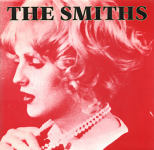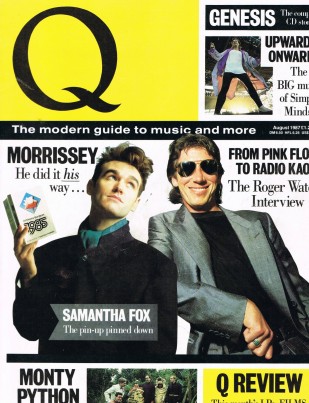1987:
March-July
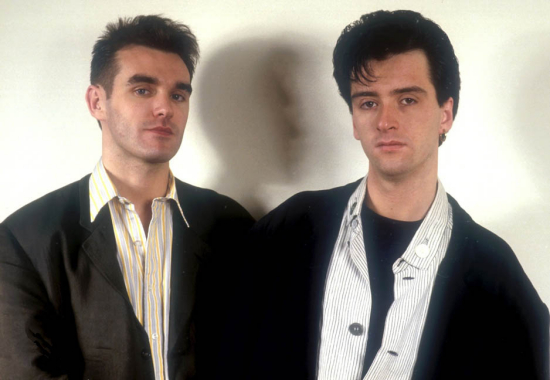
Photo by Andre Csillag. Reproduced without permission.
ALBUM REVIEWS
THE WORLD WON'T LISTEN - released March 1987
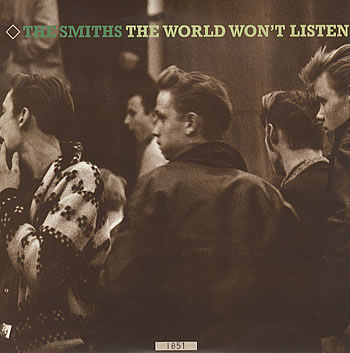
LOOKING AFTER NO. 1
"FROM the Moors Murders scandal in their early career, to the statements supporting the Brighton bombers, to the brief flirtation with the sensual, to the recent, reclusive bemused intellectual, it's apparent that Morrissey will STOP AT NOTHING to manufacture confrontations with the norm in order that The Smiths remain special.
Just check the assumed preoccupations on "The World Won't Listen" and it's obscenely obvious that Morrissey has been ruthlessly systematic in his task. "The Boy With The Thorn In His Side" (religion), "Ask" (the bomb, oh so casually), "London" (the adolescent homeless), "Shakespeare's Sister" (youth suicide), "Shoplifters Of The World Unite" (petty crime) ... all stretch veneers of social concern over rich self-parodies. It's as if the myriad dimensions Morrissey insists operate within each and every Smiths song (the personal, the political, the antagonistic, the embarrassing, the bluff, the naked confessional, the chortle, the cry for help), as well as being brave bids at true, rounded character, all serve as an armour to protect his precious group from criticism. And criticism, as evinced by their exaggerated boasts and demands for apologies for the merest slight, is what The Smiths just can't abide.
But, just because he sends himself up doesn't mean we can't see Morrissey sulking and, although he virtually reinvented the language of pop, glorifying the humdrum, unafraid to champion insignificance as REALITY, doesn't mean he's necessarily HONEST. Every time you wept to "There Is A Light That Never Goes Out", there must have been a time when you were aware of the soap opera being played out. And now there's "The World Won't Listen", a compilation of Morrissey's favourite Smiths songs.
The true irony here is that it was always supposed to be cheap to be a Smiths fan. As the very name intends, they set out to celebrate the most mundane of miseries and they're so romantically attractive because Morrissey, in his time of triumph, is a man out of time appealing to the increasing number of young(ish) people who, because they're poor or as an artistic gesture, have chosen to disinherit themselves from the notion of modernity. Whether as protest against what they see as the moral bankruptcy of business-oriented fashion-pop or because they've fallen for the cute but simplistic equation between technology and dishonesty, Smiths fans swallow Morrissey's Luddite stance wholesale, bathe in the purity of Johnny Marr's redeeming guitar and, if they're really sharp, chuckle at Morrissey's sarcastic fashion appendages (gladioli, NH specs, hearing aids!).
Yes, it used to be cheap to be a Smiths fan. You can make a virtue of being a social retard, you could stay at home and wallow in Morrissey's beautiful bedsitter images. The Smiths fan was an individual marked out from the crowd, a proud leper. But lately, in his perpetual need to IRRITATE, to keep The Smiths APART, Morrissey's taken on a cosmetic political stance which could be a dark mirror intentionally reflecting the pathetic propaganda that pollutes this nation just prior to a general election.
"Panic", after all, is an anti-dance song set to the nearest The Smiths have ever come to a dance beat, the exhortation to "Hang the blessed deejay" a wicked slant on the tabloids' call to bring back the death penalty. "Shoplifters ... ", too, is a cheeky community anthem - accused of nicking "Panic" from T-Rex, only The Smiths would have the audacity to DO IT AGAIN. But, The Smiths fan can no longer exist in splendid isolation. While the more altruistic among us might suggest that Morrissey has assumed some godlike responsibility to help the meek inherit the earth, in all honesty these hilarious mock call-to-arms are more exercises in self-preservation, Morrissey turning the social climate to his own advantage.
It's a perverse twist, too, from his glorious betrayal of the romantic individual and his newly acquired Messianic muckabouts to his latest outrage. For "The World Won't Listen" includes just ONE previously unreleased track, the inconsequential "You Just Haven't Earned It Yet, Baby". All the classic Morrissey manoeuvres are being brought into play here - the rumours (denied) that this LP is a way of hastening out of the Rough Trade contract (scandal!), the title with its implications of reaching a wider audience (Messianic!), the cover, a dated paean to teenage delinquency (self-parody!) - yet pull all that away and it's you, the Smiths fan, who Morrissey's mocking.
A career in outrage is a fine place to be but some jokes just aren't funny anymore."
Steve Sutherland
Melody Maker, February 28, 1987
Reprinted WITHOUT PERMISSION for non-profit use only.
See the original review here
"This collects together all the Smiths singles (A-sides, B-sides and a few "bonus songs") since the beginning of 1985 and thus, as any Smiths fan will tell you, is chock-full of unbelievably brilliant songs like "Ask", "Panic", "There Is A Light", "Big Mouth Strikes Again" (sic), "Half A Person" and "The Boy With The Thorn In His Side". Any Smiths fan will also tell you that this collection is a rotten swizz - they've included just one "new" song (the admittedly wonderful "You Just Haven't Earned It Yet Baby") to make everybody who's already got 16 of these songs pay £5 to get the last one. The rotters." (9 out of 10 for the music; 2 out of 10 for the idea)
Chris Heath
Smash Hits
Reprinted WITHOUT PERMISSION for non-profit use only.
Keeping up with the Smiths
"THE SMITHS have done it again. But no one was very surprised when they topped the New Musical Express readers' poll in best LP and best group categories, had three entries (including number one) in the best single, and saw their lead singer, Morrissey, voted best male singer and most wonderful person. (He even got third in the sex symbol category.) NME readers are known for their faithful adherence to the Chosen Ones (not the name of a group). For years it was the Jam who could do no wrong, now it is Morrissey and his Melancholy Men.
Having already waxed lyrical about the Smiths some weeks ago, I shall content myself with mentioning that their compilation album The World Won't Listen is currently available, and very good value it is too*. As you might expect from a compilation, it is full of riches, including the new singles "Ask" and "Shoplifters of the World Unite". It's almost too full. Each song is so good that you don't have time to recover between tracks. Still, no one ever died of excess of music, except perhaps Jean-Baptiste Lully (1632-87) who struck his foot too forcibly while conducting the King's Musick and died of the resultant gangrene."
Imogen de la Bere, New Zealand Listener
Reprinted WITHOUT PERMISSION for non-profit use only.
* As the reader will have observed, some UK critics considered The World Won't Listen compilation a cash-in. But for Australasian Smiths fans the LP was a relatively inexpensive way to catch up on unreleased Smiths singles, and attendant B-sides, available previously as expensive imports only.
See the original review here
SEE ALSO: Imogen de la Bere's review of 'The Queen Is Dead'
WORLD SHUT YOUR MOUTH
"WE COULD talk for a thousand years, but nothing quite explains why you just want to yell with joy when you hear the opening bars of 'Bigmouth Strikes Again' or why you so warmly purr to maudlin singalongs like 'Asleep'. Hey! Lost in music and lost for words, you'll yell or purr but all you can understand is that The Smiths are special and you'll hug them to your heart.
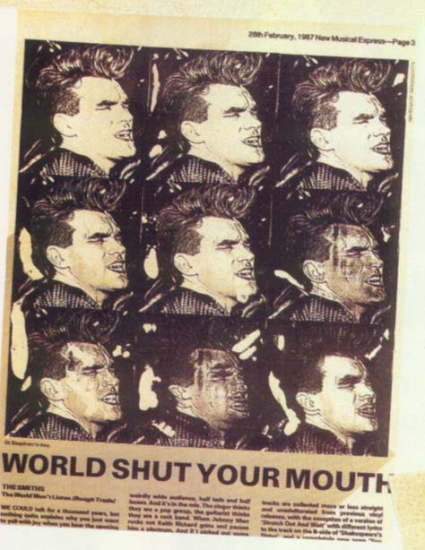
Take a look out there at those pop charts, those wastelands of irrelevant pap, and it's clear we wouldn't have much if we didn't have The Smiths. The Smiths are best when they are high in the charts, when their songs are so concise and so POP in their appeal, when the B-sides are slinky, slow numbers.
And they are best up there because then they are fighting back, worrying the tabloids, providing a welcome antidote to the useless placebo of modern pop; that which serves only to decorate this country, this country so cruelly divided into tyrants and paupers. The tyrants despise the unhappy and damn the non-conformist. The Smiths answer back.
The Smiths succeed because they are a singles band and a rock band, with a weirdly wide audience, half lads and half lasses. And it's in the mix. The singer thinks they are a pop group, the guitarist thinks they are a rock band. When Johnny Marr rocks out Keith Richard grins and passes him a plectrum. And if I picked out some more bits of rock, I'd throw you the 'Metal Guru' influence in 'Panic' and the Thin Lizzy bit in 'Shoplifters Of The World Unite' (it comes just after the music stops a second, a third of the way through).
It's Morrissey, old swivel hips, who makes The Smiths extraordinary. He's widened the vocabulary of pop music, not just by what he sings about, but by the way he phrases it. He's luxuriated in words all the days of his life, and even the bleakest lyric is enlivened by the way he teases the meaning as he sings: It was dark as I drove the point home/And on cold leather seats/Well, it suddenly struck me/I just might die with a smile on my face/After all."
There's a rough division on 'The World Won't Listen' between the wholly melancholy songs like 'Unlovable' and 'That Joke Isn't Funny Anymore', which are grouped together on one side, and the singles like 'Panic' and 'Bigmouth Strikes Again' on the other.
'The World Won't Listen' is the natural heir to 'Hatful Of Hollow' except that these tracks are collected more or less straight and unadulterated from previous vinyl releases, with the exception of a version of 'Stretch Out And Wait' with different lyrics to the track on the B-side of Shakespeare's Sister', and a completely new song 'You Just Haven't Earned It Yet, Baby'. There's nothing here to compare with the splendour of 'How Soon Is Now' the storytelling power of 'This Night Has Opened My Eyes' or the wide-eyed desire of 'Please, Please, Please Let Me Get What I Want'; and it's unlikely to win any new recruits to the Smiths' cause. In the context of this compilation, 'Ask' and 'Shakespeare's Sister' seem like the two weakest Smiths singles. 'Shakespeare's Sister' is a great title wasted.
But, in their finest moments, The Smiths make music that tugs on your memory and gives you great hope; the last Romantics, they provoke a more direct emotional response than any other band in the world. And it's fitting that 'Rubber Ring' should come at the end of this LP. It's an elegy for a music-filled past, a look back on the lifelines provided by the "songs that made you smile and the songs that made you cry".
We're halfway to Paradise, here, now, with The Smiths.
Dave Haslap
New Musical Express, February 28, 1987
Reprinted WITHOUT PERMISSION for non-profit use only.
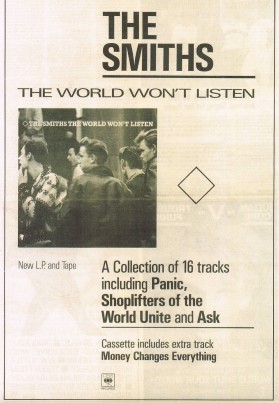
SINGLE REVIEWS
SHEILA TAKE A BOW - released April 1987
"An adequate, rather than particularly inspired, Smiths single still shreds the rest of the week's pop dross with Morrissey, in a 2:40 burst, urging Sheila to "boot the grime of this world in the crotch, dear". Glints of Smiths sparkle shine most clearly through the "Sheila take a, Sheila take a bow" chorus while the rest of the song cruises through typical ponderings about living alone, melancholia, homework and sad songs. With Candy Darling on the cover, this is, as always, the sleeve of the week.
On the B-side's 'Is It Really So Strange?', Morrissey's extraordinary interest in ludicrous misfortune swells with crazed absurdity as he careers between the North and the South, sighing all the while that "oh yes you can kick me, and you can punch me and you can break my face". Inevitably, he can't "help the way I feel" and so he lapses into confusion before killing a horse, murdering a man and losing his bag in Newport Pagnell. This, of course, is a perfectly reasonable lifestyle for a Morrissey character to follow and the song chugs along familiar Smiths lines.
'Sweet & Tender Hooligan' is far more frenetic - a thrashing shuffle of a Marr tune. Like the two other tracks it improves with repetition and Morrissey does squeeze in a brief rolling, muted moan, two-thirds of the way through, which is as distinctive as his "hooligan" phrasing."
Donald McRae
New Musical Express, April 18, 1987
Reprinted WITHOUT PERMISSION for non-profit use only.
"...their poorest seven-inch to date."
Danny Kelly
New Musical Express
ALBUM REVIEWS
LOUDER THAN BOMBS - released May 1987
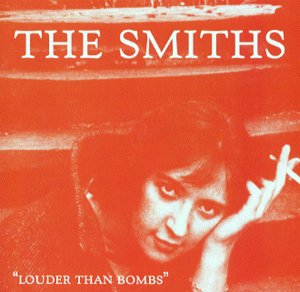
Jim Farber (Rolling Stone) and Roy Trakin (Creem) review the US compilation LP 'Louder Than Bombs'.
"Morrissey is modern pop's most creative masochist. From the start, the Smiths' singer and lyricist knew how to turn self-loathing into a virtue – by redeeming it with humor. Now after three U.S. albums establishing that M.O., this double package picks up the loose ends of the Smiths' career and gives Morrissey's character new depth. Only seven of the twenty-four songs are new. The rest are singles, B sides and castoffs. But Morrissey's sharply defined character, the flowing melodies of guitarist-songwriter Johnny Marr and the precise production ties them all into a finely detailed whole.
In terms of sheer directness, Morrissey has definitely outdone himself on this album, kicking off side one with "Is It Really So Strange?" an open invitation to punch him, kick him and break his spine. Of course Morrissey delivers such declarations totally deadpan. In fact, his withering, overdramatic vocal style has become his greatest comedic tool: the more he moans, the more you'll howl.
Upping the deadpan approach significantly is Johnny Marr's earnest music. Gorgeous acoustic-driven numbers like "Ask" and "William, It Was Really Nothing" invite a refreshingly undefended rush of emotion. A few songs do disappoint musically, like the aimless "These Things Take Time." But generally Marr's music proves as durable as Morrissey's persona.
Interestingly, what really makes that persona hold up has less to do with the obvious – Morrissey's humor – than the heavy dose of desperation he reveals behind it. Morrissey's sarcasm may lend him an air of self-awareness, but on another level he communicates feelings of deprivation deep enough to make those lyrical exaggerations seem absolutely literal. No small wonder, then, that audiences identify so closely with Morrissey. He speaks for the masochist in all of us." ****1/2
Jim Farber
Reprinted WITHOUT PERMISSION for non-profit use only.
"More musique maudit from the muezzin of melancholia. 'So if you have five seconds to share/Then I'll tell you the story of my life/Sixteen, clumsy, and shy' (sic), mourns Morrissey, who captures the awkward angst of adolescence better than any songwriter currently working within rock 'n' roll. Call 'em morbid, call 'em pale, Morrissey and sidekick Johnny Marr have made the Smiths the leading contenders to follow U2 into the Next Big Thing arena sweepstakes.
Which would be gratifying on any number of levels, not least of which is Morrissey's doomed, hyper-romantic bard, a high-low brow blend of Shelley and Keats, Reed and Morrison and Laurel and Hardy. There's more gloom und doom here, boys and girls, but there's giggles aplenty too. What else can you say about a guy who sings, 'I was looking for a job, and then I found a job/And heaven knows I'm miserable now...why do I give valuable time/To people who don't care if I live or die?' That he loved the Beatles, Bach and Beethoven? And he's fully prepared for martyrdom?
How do I love the Smiths? Let me count the ways. 'Louder Than Bombs' is a double-album which gathers some of the band's U.K. singles and B-sides together with seven brand-new songs, but it stands as an epic work, coming as it does on the heels of last year's magnum opus, The Queen Is Dead. Rock or racist, gay or straight, fey or faking, the Smiths are a thinking fan's rock band. Morrissey is a postmodernist Hamlet, deciding whether he should live or die, and somehow the thought process becomes a slapstick meditation on the healing nature of art. 'Oh yes, you can kick me/And you can punch me/And you can break my face/But you won't change the way I feel.'
The set includes such controversial U.K. smashes as 'Shoplifters Of The World Unite,' 'William, It Was Really Nothing' and 'Panic,' the latter of which has been criticized as an anti-black diatribe on the basis of its anthemic chorus, 'Hang the D.J.,' which, come to think of it, is not such a bad idea in this age of tight radio playlists.
But the Smiths are not all Morrissey's sublime wordplay and mock morose mindset. There's guitarist/co-songwriter extraordinaire Johnny Marr, who creates a thick stew of multi-textured but sharply defined melodic pop to cushion his sidekick's prickly persona. Check out the lush, shimmering cover of the 1965 obscurity 'Golden Lights' (credited to one Twinkle) or the hypnotic, onomatopoeic instrumental, 'Oscillate Wildly,' to see what Johnny can do on his own. Marr does more with less than any musician this side of Peter Buck and Bob Mould.
The bottom line is still how you feel about the troubled troubadour himself, though. People either love Morrissey or can't stand his celibate, asexual longing, finding it insufferably pretentious. In the tradition of all great rock 'n' roll (in my book anyway), the Smiths make you draw the line and come out fighting. I'll take 'em over the P. Furs, Cure, Cult, New Order or any other current anglobands vying for the Yankee dollar and the vast teenage wasteland. Who said we won't get fooled again?
After all, how can you not embrace a guy who croons, 'Shyness is nice, but/Shyness can stop you/From doing all the things in life/That you'd like to... Ask me - I won't say "No" - How could I?' I second that emotion. There hasn't been a poet who articulated teenage heartache so effectively since Smokey Robinson. Would I lie to you?"
Roy Trakin
Reprinted WITHOUT PERMISSION for non-profit use only.
See the original review here
ARTICLE
This article was originally published in the July 1987 issue of Creem.
THE SMITHS'STRANGE WAYS HAVE FOUND US
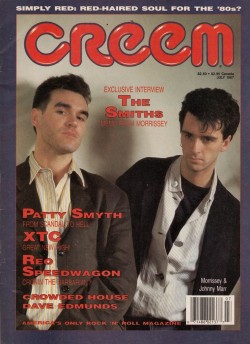
by Andy Hughes
When you come to interview a man who personifies the term "English" in the way that (Stephen) (sic) Morrissey of the Smiths does, it's no surprise that tea is served early in the proceedings.
"You do take milk, I presume?" inquires Morrissey ("No one has called me Stephen for a very long time."). And if you do take sugar, I'm afraid you'll have to leave the room." Couldn't I sneak a couple of hits while you avert your eyes, I wonder.
"I spend most of my life averting my eyes," intones Morrissey, solemnly, as the twinkle in his own negates the seriousness of the moment. It's a sort of test. I think I passed.
It's this kind of quirky, off-beat Englishness that Morrissey brings to life in the Smiths that has made them a massive world-wide success, with hit singles in every country except the U.S.A. Why don't the Smiths have hit singles in America? Because their record company doesn't release their singles in America. But, hopefully, all that is about to change.
Some time ago, American music lovers switched on to Morrissey's unique diary style, which he uses to chronicle the angst of every world citizen. But it's only recently that Sire, the Smiths' American record label, has tuned into the potential mega-units the band can sell in that country - based on the Rough Trade singles from Britain that move so well in U.S. import stores. Sire has released the double album Louder Than Bombs in an effort to seep up these consistently healthy import sales. Meanwhile, the Smiths are in a British studio where their next vinyl opus is taking shape. For this release, they're leaving Rough Trade for Britain's EMI... and the considerable benefits of major label attention, not the least of which is an advance of between two and six million dollars, depending on which story you believe.
The debate concerning the ethics of big record labels swallowing the offspring of the independent labels in the U.K. is far too involved (to say nothing of being utterly pointless) to sidetrack Morrissey as we sip our tea in the elegantly appointed lounge of the studio where the Smiths are recording. Still, with a major label behind them in Britain and the band hopefully about to become an American hit singles band, Morrissey appears to have watched the dictation of what President Reagan would call "market forces" with some amusement.
"There is a great bulk of unreleased Smith material which has been consistently rejected by our record company in America," he says. "They've released the studio albums, but not the Hatful Of Hollow collection. I think if they had released singles simultaneously in America and the U.K., the picture could have been a lot rosier."
That may be, but even as an "import" attraction, the Smiths' picture is far from fuzzy in America. And Morrissey knows this well.
"It never ceases to amaze me how Smiths fans in America feverishly collect everything they can get their hands on. They have to wait. They have to queue up. They have to sell their mothers - but they do it."
You'd think that such rabid American fandom would have meant American release from single one onwards.
"This keeps me awake every night of the week," Morrissey reckons with that earnest expression that once again makes me wonder just how seriously he means it. "The records were sold by Rough Trade in America. Sire didn't organize distribution. They probably didn't even know it was going on. They do now, though. Hence, the release of 'Louder Than Bombs'."
Doesn't that make you angry?
"Not angry, no. I think the record company was short-sighted. The Smiths could have had a hit single in the U.S. by now. I find it very hard to believe that they continually checked the material, and said, 'No, that's not right.' It's hard to believe that 'How Soon Is Now' was not a hit. I thought that was the one - and there have been others. I think the record company's attitude was the Smiths are a cast-iron immovable albums band, and that's how they'll stay, and that's how they'll grow. I think that's a shame. I like singles. We've had hit singles in every country in the world, except the U.S., where we have a massive following. It's confusing."
True, it is confusing. In certain areas, the Smiths are a huge concert attraction, often outselling acts with major action in the American charts. Would Morrissey care to name a few names here?
"Well, I can, but I don't want to sound bitter or twisted. An example might be A-ha, whom I happen to like a great deal. On the last tour, we were doing two shows, as they were cancelling their one show because they couldn't fill the auditorium. And yet a look at the charts showed them with a single at number two and an album at number nine."
So it would seem that all that's missing for the Smiths in America are a few hit singles, such as a few of the cuts that can be pulled off 'Louder Than Bombs'. Surely, that must be the idea?
"In a sane world, yes. But I wouldn't like to speak for record companies." That is Morrissey's closing remark on the subject, delivered, as usual, with a solemn tone and twinkling eye.
Like the person in one of his best songs, Morrissey is a veritable "charming man," a refreshing discovery after the misconceptions delivered by certain music writers who've crossed his path. It's not that he's difficult, simply that Morrissey doesn't enjoy people who aren't genuinely interested in the Smiths and their music. Inquiring, as one journalist did, why he chose to use a picture of Elvis Costello (rather than Presley) on a record sleeve, or wondering what happened to the flowers he used to distribute at early gigs, are guaranteed to turn him from a warm and articulate conversationalist into a frosty mannequin incapable of saying anything but "Ummm," "Aaaaah" and "Maybe." The Smiths are quite fortunate in having him as spokesman, while tuneSmith Johnny Marr - who, as we speak, is busy recording a new song in the depths of the building - is equally able to turn out a witty phrase and a thoughtful observation. But a media man, Morrissey is not.
"And happy to not be so!" he affirms with a laugh. "I was starting to become one around 1984 when I would do anything to gain some ground for the Smiths. I did hundreds of interviews then, but I soon decided that wasn't the way I wanted to live my life."
Adjustments followed. Morrissey now carefully chooses his interviews. And the visual side of the Smiths is an area he is happy to ignore. Indeed, he takes pains to ensure that it exists as little as possible. Photographs are carefully worked out, and off-the-cuff snap situations are out of the question. Morrissey is not a man to be caught unaware. This also insures that the Smiths delete that most major of all '80's rock 'n' roll promotional devices: that is, the Smiths won't (gasp!) make videos.
"I don't even use the word 'video,'" he confirms with an expression that makes me wonder if he's found a cigarette butt in the bottom of his tea cup. "Sometimes it will slip out, but I prefer to say 'film' or 'promotional device.' Anything we've done has been under extreme pressure from Rough Trade when they've been desperate to hand something to Germany or Holland. I liked the film for 'Panic' that was made by Derek Jarman. It had a nice intensity about it. But the others... I wake up in the middle of the night biting my pillow in frustration at their very existence."
Can this be? A band on the threshold of major media coverage in America - the mighty promotional machine poised and ready for action - and this Smiths fella's trying to say they won't be doing any videos? He must be kidding. People expect videos in 1987!
"Well, they shouldn't" is Morrissey's disarmingly simple solution to an MTV programmer's worst nightmare.
"It's obvious that video is never going to work for the Smiths. I totally and utterly despise video, more now than I ever did. It's totally vacuous and uninteresting. I love music. We all do, and we listen to it constantly. But whenever I see a group I like in a film, I always end up thinking, 'Such a shame, they look so silly...'"
Actually, Morrissey has a point. I saw the vid... uh, promotional item for an early Smiths' release, and he's quite right. It'll never work for the Smiths.
But are they worried? Of course not. We're talking about a band that made huge inroads into the American national consciousness without radio play - a feat which made a lack of MTV coverage seem like an oil leak in J.R. Ewing's Cadillac. Morrissey pours more tea, settles back, and explains.
"We did have the support of the college radio stations for a while, but I've never, ever heard the Smiths on a network station - and I've been to America many, many times. I have heard our records on daytime television soap operas during two separate occasions. Maybe that is more important (in America). I don't know. As a result, we were very surprised at the live reaction we got the first time we toured the States in 1985. We were amazed at the size of the venues we could play. And when we came back in 1986, we were doing two nights in some venues that we considered very large, 10 to 15 thousand people."
By British standards, that is large. In the U.K., a top chart act will be delighted to fill an average concert venue that holds two-and-a-half thousand people. Mega-stars will sigh with relief if "Sold Out" signs adorn a 12,000 seat hall. This makes the Smiths very big cheese indeed, a fact that is studiously ignored by the British music press who prefer to debate the ethics of leaving a street-credible independent label for the evil capitalist advances of a major deal. Meanwhile, the Smiths repeat their success formula from the U.K., across the pond in the States: heavy on the worthwhile, limited radio exposure; laid-back on the heavyweight press analysis. Oh, yeah, and a live reaction that knocks spots off of most minstrels tapping out a tune these days.
"The atmosphere has been frighteningly hysterical sometimes," Morrissey ruefully recalls. "There have been riots. I've been dragged into orchestra pits and the stage set has been destroyed. And that was on our first American tour! I think it's just people having a good time, and they've never intended any serious harm. We've broken through in America with records and radio sessions the same way we did in England. People hear our music before they read any blurb in the music press, so it's just people reacting to our records. It's obvious that the Smiths could never be promoted in that typical slaggy way."
Riots? Morrissey being manhandled by rabid Smithies? As someone who saw them on their first British tour, watching Morrissey hand out flowers from a three-foot high stage to rows of static, open-mouthed believers, I can only wonder and shift my imagination into overdrive.
Of course, that was then, but this is now. There have been riots in England, too. One tabloid scandal sheet wanted to underline the faint but persistent buzz of scandal that follows Morrissey's more pugnant views by insisting that the crowd who yanked him offstage at one concert were outraged supporters of the Royal Family who found themselves unable to cope with the pressures of a man who'd have the audacity to name an LP The Queen Is Dead. Morrissey lends no credence to that sort of hysterical crap by discussing it at length, but it must point to the possibility that, somewhere along the way, the Moral Majority and PMRC will probably be sticking their septic noses into a Smiths' lyric sheet. Morrissey isn't worried.
"It could get me into trouble. No doubt there is someone out there waiting for the Smiths to blow into their town. I've never been aware that any of my lyrics are controversial. But in the morbidly barren world of pop music, they tend to stick out, so journalists get excited and want to turn what is essentially a statement into a campaign. A journalist's life must be so mundane - think about the people you have to interview - so when I come along with something mildly pointed, it becomes a movement. Which it was never meant to be, and, in fact, never was."
Thought for the day: what will those same journalists make of an album title like 'Louder Than Bombs'? Or even the Smiths next studio LP, which I'm reliably informed will be called Strangeways, Here We Come? Well, be the first on your block with at least part of the scam. When the local stiffneck starts foaming at the mouth over yet another subversive pop act, you can coolly clue in that honcho that "Strangeways" is the name of a large prison in the Smiths' hometown of Manchester, England. Any other interpretation is left up to the individual. That should give you a good 10 points on the underdog-music-genius justification scale. But if the gates of commercial success really open the way I believe they will, you won't need to stick out your neck at all. The Smiths will be a household name, no matter what they call the next record.
Of course, it's just my neck that's being stuck out here. I ask Morrissey to join me on a projected ego trip, fueled by the satisfaction of major talent realized at long last. He simply smiles and is called away to add some vocals to a new track. Somewhere down the hall, the Smiths' genius rolls on and on.
I'm left to smile and collect the tea cups of this charming man.
Reprinted WITHOUT PERMISSION for non-profit use only.
Morrissey on...

Management
Are your management problems solved yet?
It's an unmitigated disaster. It's one of the things that makes me very depressed. We've been through a catalogue of managers, none has really been suitable. And the last one was a great shock because it did seem for once in our lives that everything was going to be ironed out and the future was quite solid. And he lasted five and a half weeks. And he's not going to go down without a hideous great big dirty fight. It's very depressing for instance to think that he is going to fight for fifteen per cent of everything we earn for the next twelve months. He's not going to get it but fighting him off is going to cost an enormous amount of money and physical hardship. I get depressed by people who simply want the money, who simply arrange their situations so that their entire lifestyle, in every minute detail, is financed by the group. And this always happens, I imagine, with people who surround a successful group. The people in the whole network slyly organise themselves and situate themselves in such a position that you are constantly financing their every move, whether it literally be buying a can of dogfood for their dog. In some way they can make it seem as though they simply have this dog because of The Smiths. It really annoys me because we do pay enormous bills on a monthly basis to people who I don't even know and some people who I don't even like - people just along for the frills.
Are you now looking for a manager? Could you cope without one?
I can't imagine signing any more contracts because it's been so consistently awful. But similarly, to stumble through without somebody is also difficult. It's an aging process and hard to live with. You wake up at night thinking of lawyers, and certain things they'd said to you the previous day. And when you wake up the next day you instantly see the face of this tour promoter in front of you. Which isn't really very pleasant.
Oh, Such Drama!
Read more in the August 1987 issue of Q. Click on magazine cover to begin
